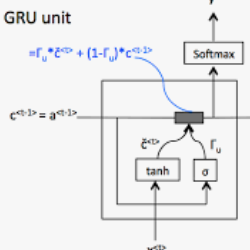The participation of consumers and producers in demand response programs has increased in smart grids, which reduces investment and operation costs of power systems. Also, with the advent of renewable energy sources, the electricity market is becoming more complex and unpredictable. To effectively implement demand response programs, forecasting the future price of electricity is very crucial for producers in the electricity market. Electricity prices are very volatile and change under the influence of various factors such as temperature, wind speed, rainfall, intensity of commercial and daily activities, etc. Therefore, considering the influencing factors as dependent variables can increase the accuracy of the forecast. In this paper, a model for electricity price forecasting is presented based on Gated Recurrent Units. The electrical load consumption is considered as an input variable in this model. Noise in electricity price seriously reduces the efficiency and effectiveness of analysis. Therefore, an adaptive noise reducer is integrated into the model for noise reduction. The SAEs are then used to extract features from the de-noised electricity price. Finally, the de-noised features are fed into the GRU to train predictor. Results on real dataset shows that the proposed methodology can perform effectively in prediction of electricity price.
翻译:消费者和生产者对需求响应方案的参与在智能电网中有所增加,这降低了电力系统的投资和运营成本。此外,随着可再生能源的出现,电力市场也变得更加复杂和不可预测。为了有效执行需求响应方案,预测电力的未来价格对于电力市场的生产者至关重要。电力价格波动很大,在诸如温度、风速、降雨量、商业和日常活动强度等各种因素的影响下变化很大。因此,考虑到影响因素,因为依赖变量可以提高预测的准确性。在本文中,电价预测模型以Gated经常单位为基础。电力载荷消耗被视为这一模型中的一个投入变量。电价的噪音严重降低了分析的效率和效果。因此,适应性噪音降低器被纳入了减少噪音的模式。随后,使用适应性噪音降低器提取去硝化电价的特征。最后,去硝化特性被输入GRU用于培训预测器。关于真实数据设置的结果显示,拟议的方法可以在预测电价时有效发挥作用。








